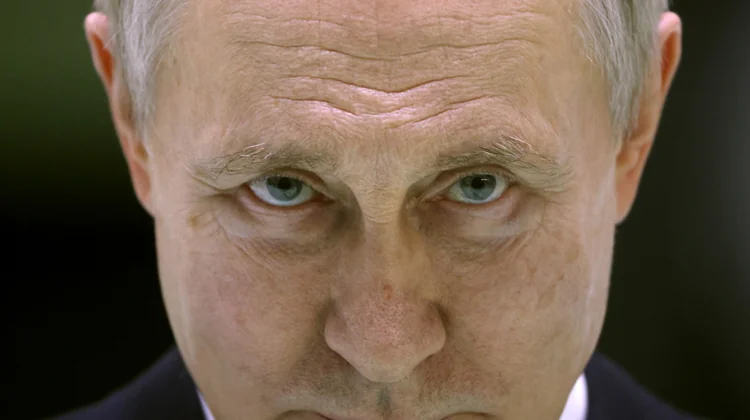
[Order Michael Finch’s new book, A Time to Stand: HERE. Prof. Jason Hill calls it “an aesthetic and political tour de force.”]
One of the most amusing comments international observers can make is on the order of wondering what Russian President Vladimir Putin is thinking. He is one of the most transparent leaders in the world today. He is former KGB. He misses the old Soviet empire. He wants it back. He resents the west for helping create its dissolution. He fails to understand that a socialist system is always going to fail, no matter how many people are murdered or imprisoned who get in the way.
President Vladimir Putin does, however, know his Russian history. He knows the following:
- – In September, 1739, the Russo-Turk War ended with Russia ceding claims to Crimea, Moldavia, and the Russian navy being barred from the Black Sea.
- – In September 1829, the Russo-Turk War ended with Russia gaining the eastern Black Sea and the mouth of the Danube River.
- – In September 1905, Russia signed a treaty in the Russo-Japanese War after the destruction of the Russian navy at Tsushima.
- – In September 1915, Tsar Nicholas II assumed command of the Russian Army contributing to Russia’s defeat in World War I.
- – In September 1917, the minority party Bolsheviks gained control of the Duma leading to the October Revolution.
- – In September 1918, the Red Terror began: the campaign of political executions by Bolshevik Cheka secret police.
- – In September 1939, the Soviet Red Army invaded Poland. Tens of thousands of Polish were killed or disappeared.
(Hat tip to a former NSA Russian speaking cousin for the helpful history.)
For decades after 1939, the Soviets blamed the Polish losses on the Germans. My college history professor Dr. Betty Unterberger, in the 1970’s did research claiming the Soviets killed many Polish and took thousands of prisoners to work camps inside the Soviet Union, for which report she was banned from ever reentering the U.S.S.R. I wondered about that issue as I traveled in the Soviet Union as an exchange student in the 1970’s. It was not until after the fall of the Soviet Union we learned that Dr. Unterberger had been exactly right.
Between May of 1988 and February 1989, the Soviet Union withdrew completely from Afghanistan after a very costly war that appeared to have no end in sight. The Soviets were sick of the war and their casualties, with nearly 15,000 Soviets killed and approximately 35,000 wounded during approximately ten years of war.
Also during the late 1980’s, the Soviet effort to keep up with the Reagan plan for a missile defense added to their extensive economic problems. By the time President George H.W. Bush took office in January 1989, the U.S.S.R. was in such vast trouble, its leader, Mikhail Gorbachev, was trying to make economic reforms to save it which ultimately was not possible. There were hardliners who believed that if he had stayed the course and not attempted to democratize the system, it would have stood. That led to an unsuccessful attempted coup of Gorbachev in August of 1991.
By September 1993, a resistance leader, Boris Yeltsin, had enough support to seize control of the House of Soviets in Moscow. Unfortunately, Yeltsin did not foster political freedoms so that when a replacement was necessary, Putin, who had shown ruthless devotion to Yeltsin and the oligarchs pushed him into being Prime Minister in August 1999. There should have been an election in 2000 for President, but Yeltsin stepped down early making Putin President, also creating early elections for which only Putin was prepared.
No matter what Putin’s title has been, since 2000, he has been in charge. He has used whatever means were available to strengthen his power, eliminate enemies, and broaden Russia’s territorial controls.
As a member of Congress, I met Ukrainian President Viktor Yushchenko and saw the physical damage resulting from the poisoning that no doubt came from Russian agents in Ukraine as Yushchenko tried to steer Ukraine into closer relations with Europe and the U.S. Having also visited with Ukrainian First Lady Kateryna Yushchenko in the President’s House in Kiev, she had a great deal more to say about the Russians’ efforts against her husband. Had she not gotten him to a hospital outside of Ukraine, he most likely would have died. Both she and her husband are quite brilliant and were seeking great days for Ukraine. Putin was determined to prevent that and still is.
Also as a Congressman, I had a lengthy private meeting in Kiev with former Ukrainian Prime Minister Yulia Tymoshenko who spent decades being pursued for bogus criminal allegations and evening being imprisoned where she suffered horrific abuse, all at the hands of corrupt Ukrainian leaders who apparently got their directions from Russia. Her main offense was leading unwaveringly in the fight for Ukraine’s independence from Russia and against corruption within Ukraine. Russian leaders and corrupt Ukrainian officials saw her as the civic-minded threat she was and is.
In recent days, many foreign policy pundits have publicly recalled that Putin first moved into Crimea and eastern Ukraine during the Obama/Biden administration beginning in February 2014. What I do not hear them pointing out is the green light that the administration gave them for such a move.
Putin had invaded Georgia while George W. Bush was President. He and his administration were outraged, used sanctions against the areas Russia tried to annex, used our military to assist the Georgians in peacekeeping actions, and made clear that this had a terribly chilling effect on US-Russia relations. Personally, I felt they could have done more, but they at least did something.
When Obama became President, however, he sent new Secretary of State Hillary Clinton over to Russia with a goofy reset button. They wanted Putin to understand that they would not be dramatically overexcited in responding to Putin’s actions like the Bush administration. Intended or not, the message Putin received loudly and clearly was that if Russia invaded a country during their administration, they would not hysterically overreact the way the Bush administration did. They wanted to reset relations and have a great relationship going forward despite the evils the Russian leader had inflicted on other nations. It was all laughs and merrymaking. If you were Putin, would you not take that to be a green light to move into Crimea? That is exactly the way Putin took it. He moved into Crimea and areas of eastern Ukraine during their administration.
During President Trump’s first term, Putin made no additional moves. He knew for all of Trump’s friendliness, he would not put up with the actions that Obama had and Biden would. So, he waited.
In January 2022, President Biden said, basically, that he expected Russia to invade Ukraine, but if it were a “minor incursion” it might not require significant action. Though the Biden-Harris administration later tried to walk back his statement, it was already public and was coupled with the attitude from the Obama-Biden administration. Vladimir Putin took Biden at his first word. As my late mother used to say, “What is down in the well is going to come up in the bucket.” What Biden truly thought, came out of his mouth the first time.
By September 2022, Putin illegally annexed Luhansk, Donetsk, Zaporizhzia and Kherson Oblasts in Ukraine.
It appears the former KGB leader Putin is well aware that he has so much at stake in Ukraine. In June this year, the Center for Strategic and International Studies in Washington estimated Russian military troop deaths at 250,000 since February of 2022. As a reminder, the U.S. lost just over 58,000 precious American military lives in Vietnam over a nearly 20 year period.
Putin will keep pushing to keep all of the Ukrainian territory he possibly can. He cannot afford to be seen as losing in Russian eyes. Historically, those who ruthlessly gain and hold power normally have great fear that others are waiting to do the same to him if given the excuse and opportunity. People who have visited Russia in the past year tell me that Russians on the street are quietly desperate for the war to end. Despite his bluster and his ongoing attacks, Putin has to be getting a bit more desperate.
The question is, how many more thousands of Russian body bags will Russians accept before they have had enough, and Putin’s powerful Russian enemies have their excuse to move against him?
All of these things make Vladimir Putin potentially the world’s most dangerous man. And America has just the answer occupying the Oval Office right now, as Putin well knows.















